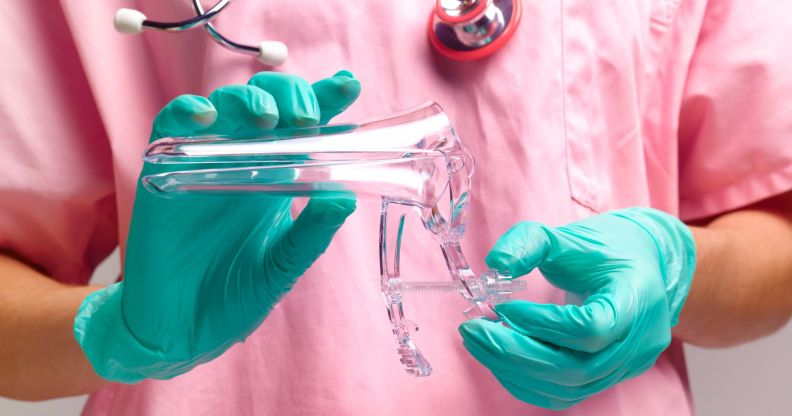Jersey government defends trans-inclusive cervical screening campaign after anti-trans backlash

The Jersey government has urged trans men and non-binary people to get a smear test as soon as possible. (Getty)
The Jersey government has doubled down on its trans-inclusive smear tests programme after transphobes criticised the protective treatment campaign.
Officials defended a Twitter post shared on Monday (23 January) advocating for trans people to book a smear test after it was overwhelmed by transphobic rhetoric.
The Jersey government’s campaign aims to encourage trans men and non-binary people with a cervix to book a screening test in an effort to destigmatise the important procedure.
But anti-trans pundits decided to view the message as an attempt to somehow “erase women” from the conversation.
Several users took issue with the phrase “assigned female at birth” (AFAB), which is often used as an umbrella term by medical professionals, arguing that, since the word “woman” wasn’t present in the post, they were being erased from discussions of cervical cancer.
But, as Jersey’s director of public health Peter Bradley has since explained, urging trans men and non-binary people to have the procedure is incredibly important in saving lives.
“The inclusive campaign, which features four local spokespeople – three women and one transgender man – invites all eligible Islanders to attend their cervical screening appointment.”
Additionally, the government’s page also shared two further posts directed at women as part of the campaign.
As Bradley explained, cervical screening tests are incredibly important in “identifying abnormalities that may cause cancer, and those at risk should book an appointment as soon as possible”.
“I am thankful to the islanders who have fronted our cervical screening campaign, which includes targeted messaging and spokespeople to maximise the reach.
“I encourage everyone who is eligible for their screening to opt-in by contacting their GP or Le Bas Centre.”
Health professionals have explained that, for many trans and non-binary people, it’s extremely difficult to go for testing due to dysphoria and fear of judgement.
But gynaecologist Dr Fiona Nelson reassured eligible people that doctors “are here to provide that service to anyone who needs it”.
“Please don’t be put off,” she added. “Healthcare professionals will not be judgemental. If you are feeling afraid or embarrassed, you can call up and explain that before your appointment.”
Healthcare professionals urge importance of smear test for trans men
Several healthcare experts and professionals have constantly urged the importance of those who have a cervix getting a smear test regardless of their gender identity.
Information regarding the importance of getting a screening is available at the nonprofit group Jo’s Cervical Cancer Trust’s website.
The group explains the process of getting a smear test, as well as what to do if you are legally registered as male with your GP but want to book an appointment.
Trans man Laurie Hodierne explained that, while cervical cancer screenings are often exhausting for trans people, they’re incredibly important.
He explained that, because he is registered as male with his GP, he isn’t automatically invited for screenings.
“I understand how the systems work and the language – and despite all of that I find it exhausting,” he said. “You keep coming up against a brick wall.
“It’s a healthcare inequality in the sense that you aren’t able to get access to the screening programme in the same way.”
How did this story make you feel?

